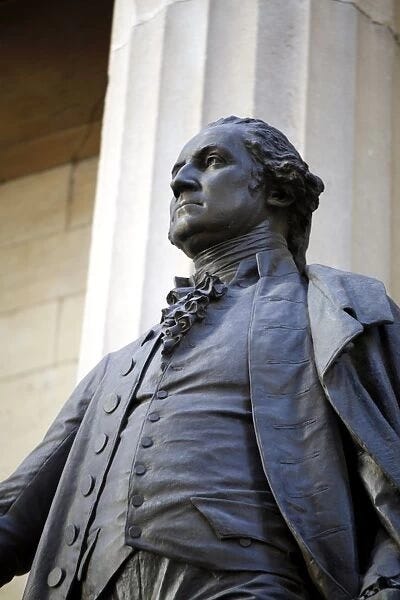Countdown to the most popular prez: Washington
6. Barack Obama
1. George Washington
Before America became a democracy, before popular vote totals in presidential elections began to be recorded, there was George Washington. He was the only candidate to receive the maximum possible number of electoral votes, and he did it twice. By the measure of popularity available in his day, Washington was, hands down, the most popular president in history.
Yet his was an unusual kind of popularity, at least by modern conceptions. He didn't like people. He wasn't comfortable around them. He didn't chat or make small talk. He didn't hide the fact that he considered himself above ordinary men (and of course women). He treated the honors that came to him—including the presidency—as no more than his due.
Nor did people like him. Even his peers in the gentry thought him stiff and aloof. Gouverneur Morris, on a bet, tried to loosen him up with a jovial slap on the back, only to have his gesture elicit an icy state that sent Morris slinking away.
Though people didn't like him, they respected him. They admired him but not with a thought of emulating him, for they deemed him unemulatable. Washington was singular, standing head and shoulders above everyone else (metaphorically, and above almost everyone else physically).
His stature reflected his greatest accomplishment: leading the United States to victory in the war of the country’s creation. His tactical skills as a battlefield commander were no better than modest. Nor was his strategic vision remarkable. His leadership was essentially moral. He believed that America must break free of Britain, and he refused to stop fighting, or to let his soldiers or Congress or the states stop fighting, until freedom was achieved.
He retired to his farm. He had no political ambitions, having had his fill of politics in his endless haggling with Congress during the war. Besides, no political office in the country matched the stature of the military office he had held as commander of the Continental Army. To be elected governor of Virginia or a member of Congress would be a demotion. Congress had a president, but this person was merely presiding officer of that body, with no independent authority.
He would have remained happily in retirement if circumstances hadn't caused a change in the nation’s government, a change that included establishment of an office worthy of him.
And not simply worthy of him but tailored to him. The delegates to the constitutional convention of 1787 merely sketched the new office of president except for details of election that made certain Washington would be the first man chosen, if he wanted the job. The sketchiness increased the chances he would want it, for it left the details for him to fill in.
The delegates let him know his country needed him as its first president. He had served his country in war. Now he must serve it in peace. He was elected unanimously in 1789, the year in which the first election was held. That is to say he received a vote from every elector. In those days electors had two votes, with the second votes going to various other candidates. John Adams received the most second votes and so became vice president.
Washington hoped to serve one term and go home. But the members of his cabinet, chiefly Thomas Jefferson, secretary of state, and Alexander Hamilton, secretary of the treasury, couldn’t agree on anything. Hamilton wanted more government, Jefferson less. Hamilton favored the federal government over the states, Jefferson the reverse. Hamilton admired Britain and loathed the French revolution, Jefferson again the reverse.
Hamilton and Jefferson separately approached Washington and said he mustn’t retire. Hamilton said the government would fall apart if Washington didn’t keep Jefferson in line. Jefferson said it would implode if Washington didn’t corral Hamilton’s ambitions. Washington grudgingly agreed to a second term. He once again received every elector’s vote.
During his second term the political fighting grew worse, aggravated by real fighting between Britain and France. The Hamiltonians and Jeffersonians marshaled their forces into political parties, the Federalists and the Republicans.
Washington refused to endorse either party but leaned Federalist, prompting Republican newspapers to criticize him, sometimes in mocking language.
Enough is enough, said Washington. I won’t stand for this. I’m out.
Before exiting office he gave farewell advice, telling Americans not to let attachment to party overrule attachment to country, and not to become beguiled by foreign interests.
He left just in time to avoid having his reputation tarnished by the intensifying partisanship. When he died in 1799 he remained as revered as ever.
He still stands above the fray. Other slaveholder founders have been censured and defenestrated, but the rising tide of criticism usually stops short of Washington. Part of the diffidence is practical. Democrats, the ones most likely to topple him, in doing so would annoy the overwhelmingly Democratic city–and national capital–bearing his name.
But there’s something else. On his pedestal, Washington is still daunting. We’ve lowered everyone else to our own level, but not him. Do you want to take on the Father of His Country?


I’ve long considered Washington the most boring of our great presidents. That’s worth thinking about as so many of the critics of our current president can’t really explain what they don’t like about him other than that he’s old and boring and they’re tired of him. The Roosevelts, Kennedys, etc., are so much more interesting but sometimes boring guys get the most important work done.
"First in war, first in peace, first in the hearts of his countrymen."
He remains idolized now, with few trying to understand or criticism (an exception being those who feel he was evil just because he was a slaveowner and for nothing else). His role in the history of the United States, though, is contested; it might not have come into existence without his leadership.